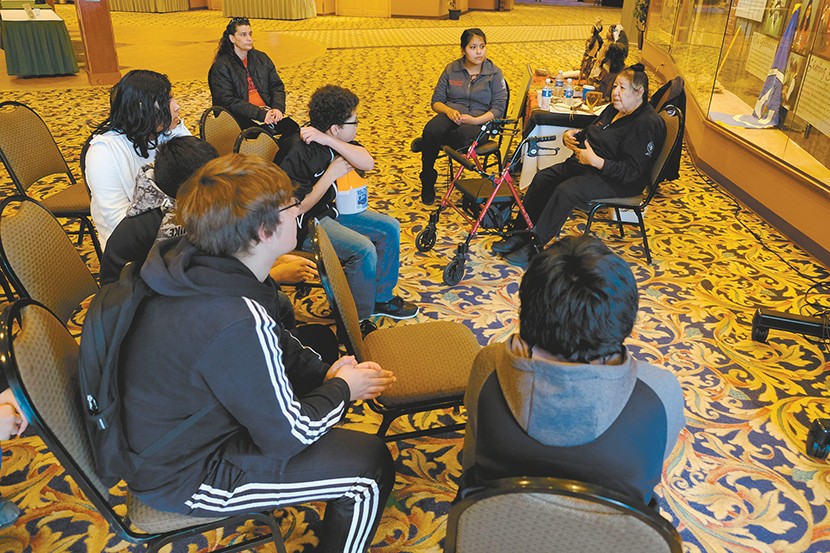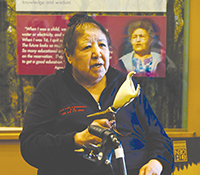
Natalie Weyaus has seen a lot of changes over the course of her lifetime. She wasn’t just a bystander, however; as a lifelong working woman, she participated in the transformation of the Mille Lacs Band from poverty to undreamed-of success.
Natalie grew up on Ataage Drive in a board house with no insulation. The house was covered in tar paper to keep the wind out. When she was little, she remembers walking to her grandma’s house when it was still light out. After the sun went down, her grandma would wrap her in a blanket and carry her home.
Much of the food came from her father’s traps, nets, and gun — rabbits, partridge, ducks, deer, and walleye. "We lived off the land," said Natalie. "We didn’t go to the grocery store as we do today. My dad worked part time for the resorts as a launch driver and guide, but it was seasonal. He did a lot of trapping and hunting and brought home meat for us to eat. We were never hungry."
Natalie didn’t care for fish, but she liked the mizay (eelpout) eggs. She also had a taste for duck brains. "They were good!" she swears.
"My older sister Letitia raised me," Natalie said. "My mom and dad were always busy driving people around since a lot of people didn’t have a driver’s license."
Her parents, John Garbow (also known as John Makwa) and Nancy Ann Benjamin, came from two of the families that never moved to White Earth. Her mother went to boarding school in Pipestone and had the opportunity to come home early but stayed in Pipestone to help care for her younger siblings.
Her parents spoke Ojibwe with each other when they didn’t want the kids to know what they were saying, but they didn’t teach their children the Ojibwe language. "My mom said we didn’t need that," Natalie recalled. As an adult, she has studied the language through classes and by listening to Elders.
Natalie attended the Vineland Elementary school through sixth grade, along with her siblings. She remembers the way the snow would chafe her legs as she trudged to school in her dress. She remembers singing Ojibwe songs into the microphone at Sherman Holbert’s Fort Mille Lacs tourist attraction on Highway 169. She also remembers her trips to Aazhoomog and East Lake to see relatives, attend ceremonies, and visit medicine men.
Working Girl
By age 12 or 13, Natalie was already a working girl, raising money for school clothes by ricing in late summer and early fall. They would process enough in the traditional way to feed those who had lost a loved one that year.
Natalie graduated from Onamia High School in 1965 and moved to the Twin Cities, where she cleaned and pressed white shirts in a laundry.
She had met her husband, Robert Howard Weyaus, at a drum ceremony, and after two years in the Cities, Natalie became pregnant with her first child. Natalie and Robert didn’t want to raise their child in the Cities, so they moved back to the reservation.
By then, big changes were already coming. The Reservation Business Committee became more active after the Minnesota Chippewa Tribe Constitution was revised in 1964. Head Start was implemented during the Lyndon Johnson administration in 1965. Reservation business enterprises included resorts and manufacturing.
Natalie stayed home until her kids were old enough for Head Start. By then she was ready to get back to work. She took a job as a teacher’s aid, and then a library aid, but her job was cut.
Natalie saw that as an opportunity. "I said, ’If they’re gonna get rid of me, I can go to school and become a teacher.’ So I went to college to get my bachelor’s degree."
As she was working on her A.A. at Central Lakes, the walkout at Onamia High School occurred, and Natalie taught math and science on the reservation for several years as Nay Ah Shing High School was founded.
When she graduated with her B.A. in 1989, there was an opening for a tribal court judge, so instead of seeking a teaching job, she ran for the position and won. Natalie served as judge for two terms until judicial elections were replaced by appointments.
When the casino opened in 1991, Natalie became a blackjack dealer, but after a few years, she grew tired of working the swing shift and took a job with a drug prevention program.
In 2000, Natalie started working in the Tribal Historic Preservation Office of the Department of Natural Resources — a job she still holds.
After 19 years, she still finds it interesting and challenging. In recent years, the THPO has been active in the Line 3 pipeline debate — arguing for an extensive cultural survey of the proposed pipeline corridor.
"We want a survey that looks at how we deal with nature, taking into consideration how everything is affected if they put in a pipeline — water, rice, animals, insects," Natalie said. "We know there were a lot of tribal trails before the highways, and we know that along the way people died and they were buried right where they passed. There are laws in Minnesota that if there’s a cemetery or burial, you have to avoid that area."
Throughout her life, Natalie has been a role model not just as a working woman, but also as a responsible and traditional member of the community. She thinks that’s why she was chosen to be a judge and a drum society member by her Elders Art Gahbow and Marge and Merlin Anderson.
"They’re the ones who appointed me to be one of the first judges on the reservation," said Natalie. "I suppose they had that respect for me, since I stayed out of trouble and graduated from high school. They put me on a drum because I didn’t party and go out to bars and drink. My dad was an alcoholic, and I didn’t want to bring my kids up in an environment like that."
She’s glad to see young Band members embracing the same kind of work ethic and sober lifestyle.
"I went to a celebration of people finishing training on leadership this past Saturday," Natalie said. "They were speaking out, projecting, speaking from their heart. That’s what I like to see — our young people taking leadership roles and moving our reservation forward on a sober note. It shows that we don’t have to depend on other people to come and fix our reservation; we can fix it ourselves. That’s what me and my sister (Alicia Skinaway) are always telling each other. All the answers are here, we just need to find them."
Natalie and many others have provided that leadership and those answers throughout their lives, and their positive influence as Elders will be felt by younger generations for many years to come.